UC Berkeley Web Feature
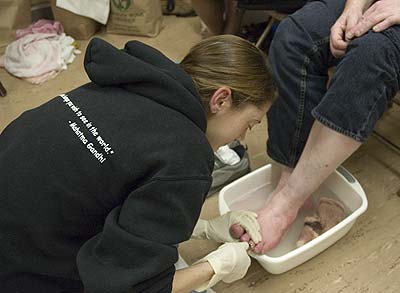 |
Third-year environmental studies and architecture major Anne Bozack performs one of the Suitcase Clinic's most popular services. (BAP photos) |
Suitcase Clinic student volunteers are changing the world, one bare footstep at a time
BERKELEY – On a chilly Tuesday night, about 40 homeless and low-income men and a couple of women are lined up outside the First Presbyterian Church in Berkeley. They are waiting for the doors to open at 7 p.m. for the Suitcase Clinic, an all-volunteer medical- and social-services operation run by Berkeley undergraduates with help from graduate students and local practitioners.
Once inside, they grab free bagels and coffee and quickly settle into another line, this one of chairs, as Suitcase coordinators write down their names and which services they hope to receive that night. "I come for the chiropractor: he straightens me out and makes me feel more balanced," explains John, a thin, bleary-eyed man who cheerfully discloses that he's schizophrenic. "And because I love talking to the students," he adds before meandering off to do just that. (John's name, and that of other Suitcase Clinic clients, have been changed or omitted to protect their privacy.)
Another client, who says he is "nobody important, just a guy trying to get himself together," waits for a free haircut from one of Suitcase's volunteer barbers. A quiet, well-spoken redhead visits Suitcase "to share, hear, and express ideas. And to have a chiropractic and get my feet washed."
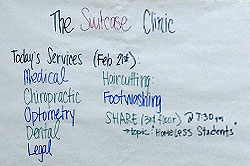 A hand-lettered sign lets Clinic clients know what's available each evening. |
The students themselves are drawn by even less tangible things. "It's a unique opportunity to talk to people who under normal circumstances you might not," says Nancy Nguyen, a fourth-year anthropology major. Others give reasons such as "because I feel like I'm getting too selfish" and "to fill a part of life that I can't from just being a student."
The volunteers' motivation seems to boil down to something very simple. "I really enjoy just showing up and knowing there's a possibility I could help someone," says Jake Becker, a vampiric, lip-ringed junior (a major in biochemistry and religious studies) who helps coordinate Suitcase's Youth Clinic. Then he shrugs, tacitly acknowledging that it's cooler these days to be cynical and ironic than sincere and passionate. "You can't expect to change the world here, because you'll be disappointed. But maybe you can help one person, and that's inspiring to me."
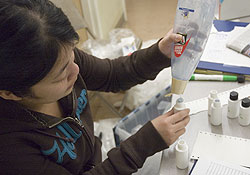 Nancy Nguyen, a fourth-year anthropology major, fills up small shampoo bottles for free hygiene kits. |
|
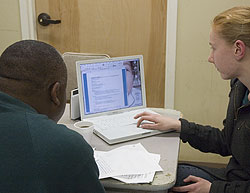 CARE and administrative coordinator Kara Bagley helps a client with putting together a résumé. Bagley is a third-year English, political science, and African-American studies major. |
|
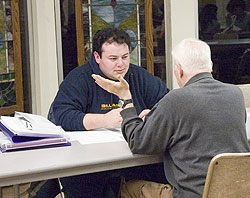 Boalt Hall law student Abe Gardner provides legal advice. |
Foot-washing and chiropractor services are among the most popular offerings of the Suitcase Clinic. Depending on which local health volunteers are available to work alongside them, the students also provide basic health-care checkups, vision screening, dental care, legal advice, social work, and a discussion group at the General Clinic on Tuesdays. The students also hold two separate clinics on Mondays: a Women's Clinic at the Dwight Women's Shelter (with additional manicure, pedicure, and childcare services) and a Youth Clinic, temporarily housed at First Presbyterian, where rock music and a dinner prepared by the students entice its authority-mistrusting young clients to come in.
Berkeley students are known for their commitment to public service — more than a third of undergraduates volunteer in the community during the school year, according to a survey by the Office of Student Research, and another 10 percent perform community service for pay or course credit. The Cal Corps Public Service Center, the campus unit that coordinates and supports student public-service opportunities, oversees dozens of community programs, from tutoring and mentoring projects to Cal Habitat for Humanity, a house-building organization.
But even in this impressive group, the Suitcase Clinic stands out for its longevity, scope, and level of commitment. Founded in 1989 by first-year students in the Berkeley-UCSF Joint Medical Program as a mobile clinic that would travel directly to homeless clients, the program was named for the suitcases in which the medical students carried their supplies. Eventually, those supplies were transported in a donated van; when the van broke down, the students moved for good into First Presbyterian. The church provides the Suitcase Clinic with its own locked room in which to store all their supplies, including the hygiene kits they put together and boxes of donated clothing, and space to conduct the clinic's various services. Its janitors also clean up afterward.
They do it all
Undergraduates helped develop the clinic initially, and soon took over its administration. "We run the show," says Jena Desai, one of three General Clinic coordinators and a fourth-year public-health and biochemistry double major. "People are amazed that we can do it all."
It's a big job, requiring 5 to 10 hours a week from its leaders. About 40 students share responsibility for the three clinics as well as for a semester-long course, Health and Medical Sciences 98/198 — not a DeCal class — that would-be volunteers must pass before being allowed to work at Suitcase. There are 47 students currently taking it.
Taught by veteran Suitcase volunteers and sponsored by the Health and Medical Sciences Division in the School of Public Health, the course trains students in the skills they need for the clinic. "The first part is about security — for example, how to handle sexual harassment and de-escalate conflict," explains Mira Lalchandani, one of the class coordinators this semester as well as a Suitcase administrator and fourth-year public-health and molecular and cell biology double major. "We also help students practice doing active listening, asking open-ended questions, and role-playing. We want them to be prepared for anything."
In the second part of the class, student leaders bring in faculty experts as guest lecturers to discuss more general issues related to homelessness. "Racism, sexism, drug and alcohol abuse, mental illness, unemployment — homelessness encompasses pretty much every social problem," says Desai.
Shadows and hoops
This Tuesday night, First Presbyterian is a hive of frenetic activity. Twenty or so experienced volunteers are showing 10 "shadows" the ropes, since the midterm is approaching. (In order to pass the two-credit course, students have to work at least three nights of the clinic during the semester.) A fast and furious game of two-on-two is ricocheting around the church's indoor basketball court. Other, less energetic visitors are watching a movie brought in by the clinic's security guard, a favor he performs every week.
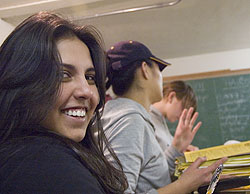 General Clinic coordinators Jena Desai, Christina Chun, and Natalie Khorochev coordinate calling names and directing clients to the services they'll receive that night. |
|
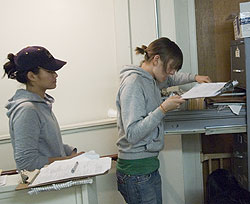 Chun and Khorochev pull clients' files to hand off to that caseworkers for the evening. |
But most Suitcase guests are milling around, talking to the volunteers. Once their names are called, clients are greeted by a student caseworker, who sits with them to record or update a basic social and medical history before helping them navigate the services being offered in various rooms. For example, when Joanne, an attractive elderly woman in a purple jacket who takes the bus every week from downtown Oakland to the clinic, told her caseworker, Lalchandani, that she was still having problems with her landlord, Lalchandani made sure she was signed up for the legal services table. She then sat with Joanne while the Boalt Hall School of Law student volunteer explained her options in taking the landlord to court.
Elsewhere in First Presbyterian, a medical student from the Berkeley-UCSF joint program is giving basic health consultations and dispensing over-the-counter medications. A graduate student from the School of Optometry is performing preliminary eye examinations. (Those who need glasses are then scheduled for a full exam on the Berkeley campus; frames are donated and the lenses subsidized by the Suitcase Clinic.) And a Suitcase undergraduate is walking clients over to a dental clinic a few blocks away that ends up handling three checkups and basic cleanings this evening.
On the third floor, in a small circle of chairs, a group of 10 or so students and clients is meeting for the Suitcase discussion group called SHARE, "Searching How to Achieve Respect and Empowerment." Tonight a story in the Daily Californian about homeless students in Berkeley has sparked a heated intellectual debate on the origins, types of, and possible solutions to homelessness.
"Just to assume that because someone's homeless as a child they're going to become a homeless adult is wrong," exclaims a small woman in glasses who says she used to be a security guard before the loss of her job deposited her on the streets. "Homelessness is not like alcoholism. Jobs are too hard to get and rents are too high, and a lot of people can't function under those circumstances."
Back downstairs in the large main room, an undergraduate "client advocate for residence and employment" staffs the "CARE" station, providing housing and food referrals, helping clients compose résumés on her laptop, and looking at job listings in the newspaper and online that might be a match for their skills. Nguyen is carefully filling up miniature shampoo bottles from a family-size version, in between handing out hygiene kits with soap, a razor, shampoo, toothpaste, and dental floss to anyone who asks. In her labeled plastic bins she also has health-education pamphlets with information on drug and alcohol abuse and quitting smoking.
The students do not discuss such activities unless their clients bring them up. "Suitcase is about serving our clientele in a nonjudgmental way," explains Desai, who has been volunteering with Suitcase since she was a freshman. "We're not trying to change people's behaviors, unless they want to."
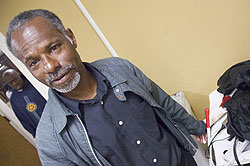 Volunteer barber Ross Robinson first came for legal advice but came back to share his own skills. |
|
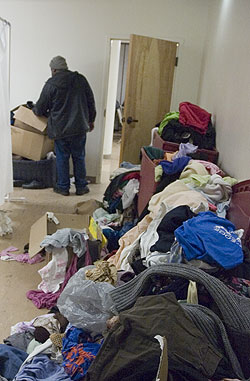 People were happily rummaging through the Clinic's stockpile of donated clothing. |
Two community volunteers are zipping shears and clippers over the heads and beards of willing victims draped in plastic sheets. One of the barbers, Ross Robinson, who makes his living with a moving business, says he first came to the clinic to seek legal advice. He has been coming back for the past four months to offer his considerable cosmetic skills. "I saw the benevolence, the caring, the students had, and I thought, hey, I have something to offer too," Robinson explains.
Near the haircut station, two students crouch over plastic tubs in which they are gently washing bare feet. As they pumice away calluses and clip toenails before patting the appendages dry and handing over clean, donated socks, they chat with their clients — that is, unless the happy recipient has fallen asleep.
Chatting in comfort
The footwashing service is one of the most vital that the clinic performs, says Desai. "Many of our clients are on their feet or walking for most of the day. They don't get to take showers very often or change their socks," she explains. With a smile, she adds, "Mainly, clients love to talk, and they're a lot more comfortable doing it when someone is washing their feet."
One of the amateur pedicurists is wearing a black sweatshirt printed with the famous Mahatma Gandhi command — "Be the change you want to see in the world" — that has inspired activists everywhere. Fittingly, it's the official Suitcase Clinic hoodie. The effects may not be immediately visible, but these Berkeley students are, with their eyes open and their egos checked at the door of First Presbyterian, devoting several hours a week to embodying change.
"Sometimes I feel discouraged because it seems like a lot of Band-Aid work, and I wonder why we can't make more of a difference in this person's life," Desai admits. "But someone once told me not to look at it as, 'Let's get everyone off the streets.' We have to help them in the way they need. And we do that."
The Suitcase Clinic accepts donations ranging from cash to clothes (socks in particular), hygiene supplies, and household items. For more information, or to offer professional services, visit the organization's website, suitcase.berkeley.edu.
*Some names of Suitcase Clinic clients have been omitted or changed to protect their privacy. Back to top

